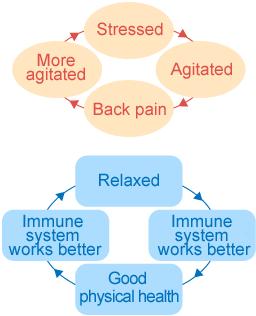Understand the Language
To make you be aware of your emotional state and address your needs, your body may send out physical symptoms when you are stressed.
If you have experienced these symptoms after starting to take care of your family member with dementia, you may want to consult your physician. He or she may then ask questions about your emotional state and stress levels.Some caregivers will experience these symptoms after starting to take care of a family member with dementia. Their physicians may ask questions about their emotional state and stress levels before providing medical advice.
Stress may bring you more anxiety, anger, or distress when you are agitated or down. Your stress levels will go up and your emotions will become more intense if you overlook or ignore this condition. As a result, you may develop various physical symptoms, or even psychosomatic disorder in the worst-case scenario.
Extended reading: Psychosomatic disorder
Feeling stressed and unhappy is very common among caregivers. About one-third of caregivers of people with dementia will experience this situation; some may even develop psychosomatic disorder.
Psychosomatic symptoms refer to physiological (somatic) distresses that are caused or made worse by emotional disturbance and stress. Stress can give you energy to overcome difficulties when you are in a good emotional state. However, it may prompt various physical conditions when you are in a poor emotional state for a long period. Your body may show physical ailments or symptoms as a signal to make you aware of your emotional state. The ailments or symptoms usually start from the body part or organ with a weakened immune system.
Common psychosomatic symptoms include headaches, dizziness, numbing, tinnitus, muscle pain, skin disorders, palpitations, gastrointestinal disturbances, genitourinary disorders, and sexual dysfunction. You may be diagnosed with psychosomatic disorder when your physician cannot find any pathological reasons for your situation after you have visited multiple physicians and tried various medications. Since this condition is closely related to one’s stress and emotional state, it is very important for you to understand and find ways to release your stress as a caregiver.
